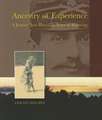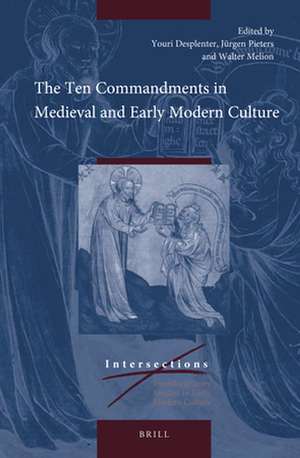The Ten Commandments in Medieval and Early Modern Culture: Intersections, cartea 52
Autor Youri Desplenter, Jürgen Pieters, Walter Melionen Limba Engleză Hardback – 14 sep 2017
Din seria Intersections
-
 Preț: 217.51 lei
Preț: 217.51 lei -
 Preț: 174.49 lei
Preț: 174.49 lei -
 Preț: 200.26 lei
Preț: 200.26 lei -
 Preț: 215.61 lei
Preț: 215.61 lei -
 Preț: 98.61 lei
Preț: 98.61 lei -
 Preț: 192.18 lei
Preț: 192.18 lei -
 Preț: 151.71 lei
Preț: 151.71 lei -
 Preț: 113.73 lei
Preț: 113.73 lei - 18%
 Preț: 1052.70 lei
Preț: 1052.70 lei -
 Preț: 236.71 lei
Preț: 236.71 lei -
 Preț: 236.71 lei
Preț: 236.71 lei -
 Preț: 224.30 lei
Preț: 224.30 lei -
 Preț: 224.89 lei
Preț: 224.89 lei -
 Preț: 236.71 lei
Preț: 236.71 lei -
 Preț: 222.05 lei
Preț: 222.05 lei -
 Preț: 107.21 lei
Preț: 107.21 lei -
 Preț: 204.54 lei
Preț: 204.54 lei -
 Preț: 197.67 lei
Preț: 197.67 lei -
 Preț: 222.22 lei
Preț: 222.22 lei -
 Preț: 221.10 lei
Preț: 221.10 lei -
 Preț: 241.62 lei
Preț: 241.62 lei - 47%
 Preț: 319.44 lei
Preț: 319.44 lei - 8%
 Preț: 315.18 lei
Preț: 315.18 lei -
 Preț: 95.95 lei
Preț: 95.95 lei - 18%
 Preț: 1199.89 lei
Preț: 1199.89 lei - 18%
 Preț: 659.67 lei
Preț: 659.67 lei - 18%
 Preț: 693.23 lei
Preț: 693.23 lei - 18%
 Preț: 1049.40 lei
Preț: 1049.40 lei - 18%
 Preț: 698.29 lei
Preț: 698.29 lei - 18%
 Preț: 681.96 lei
Preț: 681.96 lei - 18%
 Preț: 687.23 lei
Preț: 687.23 lei - 18%
 Preț: 820.55 lei
Preț: 820.55 lei - 18%
 Preț: 683.34 lei
Preț: 683.34 lei - 18%
 Preț: 667.82 lei
Preț: 667.82 lei
Preț: 605.45 lei
Preț vechi: 738.35 lei
-18% Nou
Puncte Express: 908
Preț estimativ în valută:
115.89€ • 121.52$ • 95.75£
115.89€ • 121.52$ • 95.75£
Carte indisponibilă temporar
Doresc să fiu notificat când acest titlu va fi disponibil:
Se trimite...
Preluare comenzi: 021 569.72.76
Specificații
ISBN-13: 9789004309821
ISBN-10: 9004309829
Dimensiuni: 155 x 235 mm
Greutate: 0 kg
Editura: Brill
Colecția Brill
Seria Intersections
ISBN-10: 9004309829
Dimensiuni: 155 x 235 mm
Greutate: 0 kg
Editura: Brill
Colecția Brill
Seria Intersections
Cuprins
AcknowledgmentsNotes on the EditorsNotes on the ContributorsList of IllustrationsIntroduction: Exploring the Decalogue in Late Medieval and Early Modern CultureYouri Desplenter and Jürgen Pieters1 The Ten Commandments in the Medieval Schools: Conformity or Diversity?Lesley Smith2 ‘Ché se potuto aveste veder tutto / mestier non era parturir Maria’: Dante on the Decalogue as a Means to SalvationLuca Gili3 Fit For A Prince: The Ten Alternative Commandments in Christine de Pizan’s Epistre OtheaCharlotte E. Cooper4 Loving Neighbor Before God: The First Commandment in Early Modern Lyric PoetryGregory P. Haake5 The Ten Commandments and Pastoral Care in Late-Medieval and Early Modern Europe: An Inquiry into Expectations and OutcomesRobert J. Bast6 The Ten Commandments in the Thirteenth-Century Pastoral Manual Qui bene presuntGreti Dinkova-Bruun7 Morals from a Mystical Cook: Jan van Leeuwen and the Ten CommandmentsYouri Desplenter8 Latin Mnemonic Verses Combining the Ten Commandments with the Ten Plagues of Egypt Transmitted in Late Medieval BohemiaLucie Doležalová9 The Ten Commandments in Preaching in Late Medieval Poland: ‘Sermo de praeceptis’ from Ms. 3022 at the National Library in WarsawKrzysztof Bracha10 The Law Illuminated: Biblical Illustrations of the Commandments in Lutheran CatechismsHenk van den Belt11 Man and God: The First Three Commandments in the Polish Catholic Catechisms of the 1560s–1570sWaldemar KowalskiIndex Nominum
Notă biografică
Youri Desplenter, Ph.D. (2004), is Professor of Historical Dutch Literature (Middle Ages) at Ghent University. He has published on Middle Dutch religious literature, including De Bijbel in de Lage Landen. Elf eeuwen van vertalen (Heerenveen: 2015; edited with P. Gillaerts a.o.).
Jürgen Pieters, Ph.D. (2000), is Professor of Literary Theory at Ghent University. He is the author of several books on the methodology of New Historicism and of a recent monograph on Constantijn Huygens: Op zoek naar Huygens. Italiaanse leesnotities (Gent, 2014).
Walter Melion, Ph.D (1988), is Asa Griggs Candler Professor of Art History at Emory University in Atlanta. He has published extensively on Dutch and Flemish art and art theory of the 16th and 17th centuries, including The Meditative Art: Studies in the Northern Devotional Print, 1550-1625 (Philadelphia: 2009).
Jürgen Pieters, Ph.D. (2000), is Professor of Literary Theory at Ghent University. He is the author of several books on the methodology of New Historicism and of a recent monograph on Constantijn Huygens: Op zoek naar Huygens. Italiaanse leesnotities (Gent, 2014).
Walter Melion, Ph.D (1988), is Asa Griggs Candler Professor of Art History at Emory University in Atlanta. He has published extensively on Dutch and Flemish art and art theory of the 16th and 17th centuries, including The Meditative Art: Studies in the Northern Devotional Print, 1550-1625 (Philadelphia: 2009).
Recenzii
"The main merit of the volume is not only that it follows the dissemination of the Decalogue over a broad chronological period; it is especially that it widens the horizon of the investigation on the one hand on less frequented geographical spaces, on the other on literary subjects and genres distant and in some cases completely unrelated to the theological discourse."
Silvana Vecchio, University of Ferrara, in Speculum 94/4, pp. 1144-1145
"compelling articles, that deserve significant attention [...] it succeeds in bringing new insight into the Decalogue's place in western culture
Edward Allen, Union College, in Sixteenth-Century Journal XLIX.4 1157-1158
Silvana Vecchio, University of Ferrara, in Speculum 94/4, pp. 1144-1145
"compelling articles, that deserve significant attention [...] it succeeds in bringing new insight into the Decalogue's place in western culture
Edward Allen, Union College, in Sixteenth-Century Journal XLIX.4 1157-1158
